This article was co-authored by Kateri Berasi, PsyD and by wikiHow staff writer, Janice Tieperman. Dr. Kateri Berasi is a Licensed Clinical Psychologist and the Founder of Transcendent Self, PLLC, a group therapy practice offering affirmative, collaborative, and intentional care, based in Brooklyn, New York. With over ten years of experience in the mental health field, Dr. Berasi specializes in working with adults from the LGBTQIA+ community and creative industries through individual therapy, couples counseling, group therapy, and costume therapy. She holds a BA in Psychology, Art History, and French Language and Literature from George Washington University and an MA and MEd in Mental Health Counseling from Columbia University. Dr. Berasi also holds a PsyD in Clinical Psychology from Long Island University.
There are 16 references cited in this article, which can be found at the bottom of the page.
This article has been viewed 11,334 times.
Understanding and embracing who you are is an incredibly fulfilling but difficult journey, especially if your family isn’t accepting of the LGBTQ community. There’s no easy way to deal with homophobic parents or guardians, no matter where you are in your personal journey. The most important thing is that you focus on your own mental and emotional wellbeing, so you can live your truth without feeling afraid. This guide will walk you through some suggestions if you’re planning to come out, stay closeted, or if you’re looking for a way out of a toxic home life.
Steps
Confronting Homophobia
-
1Talk to your relatives about their homophobia. There’s no easy way to deal with or process homophobia, especially when it comes from a close relative. Instead, ask your family member why they feel the way that they do, and why they insist on making homophobic remarks. Don’t insult them—instead, be open about how their comments make you feel, and how you wish they would speak instead.[1]
- For instance, you can say something like, “Why do you make such rude comments about the LGBTQ community?” or “Why do you feel the need to say offensive language?”
- The exact way you handle this conversation will depend on a lot of things, like how intense your family member's homophobia is and whether you're comfortable trying to change their opinion. It's up to you to decide how you want to respond.
- It can be really tough, but try to stay calm during the conversation. While it’s really tempting to lash out, yelling and mean remarks will only escalate the conversation.
-
2Help your family understand what homophobia is. If your family members are more open-minded, it might help to remind them that homophobia is any kind of prejudice against gay members of the LGBTQ community. Explain how homophobia can be spread through casual language, as well as obvious slurs. Additionally, mention how homophobic attitudes can lead to hate crimes, where LGBTQ individuals are the targets of violent crimes.[2]
- For example, comments like “That’s so gay,” “No homo,” and more severe slurs are examples of homophobia.
- Keep in mind that if you're not comfortable doing this, you don't have to. You aren't responsible for trying to correct or change a person with homophobic beliefs, especially if you feel like the situation could become heated.
Advertisement -
3Participate in a civil discussion with close-minded relatives. Holiday gatherings can be incredibly tough, especially if some of your relatives are bigoted. Don’t be afraid to address some of their comments or beliefs head-on as they come up in conversation, instead of ignoring or laughing them off. If you don’t have the energy or emotional stamina to put up with their remarks, simply check out of the conversation mentally.[3]
- For instance, if a relative makes an off-color joke, say something like, “I don’t think that’s a fair statement to make,” or “You shouldn’t say things like that.”
- Try expressing how you feel when your relative makes homophobic comments. For instance, you might say something like, “I feel like you don’t respect me as a person when you use slurs against gay people.”
-
4Call out your family if they use homophobic insults. Let your relatives know that slurs and other derogatory comments are hurtful. Point out that these remarks are harmful to your identity and the identities of other LGBTQ+ people. Ask them to replace slurs like "That's gay" with language that doesn't describe sexuality in a negative way.[4]
- You can say something like, “It’s really hurtful to hear you say things like that.”
- For extra emphasis, point out that many schools have anti-homophobia policies and curriculums.
Strategies for Coming Out
-
1Come out only if you feel safe and supported. Coming out can take a huge toll on your emotional and mental health, especially if your confession reaches ignorant ears. Before starting the conversation, think about your living situation. Are you completely dependent on your parents financially, or could you leave home if your parents or guardians don’t take the news well? Make a decision that is best for your mental and emotional health—after all your health and safety is always most important.
- Coming out can really change the morale and emotional climate around your home, which isn’t great for your mental health. If you think coming out will make living at home unbearable, you might want to hold off.
-
2Don’t come out if you don’t feel safe doing so. Coming out is a big, emotional decision that should always be made on your own terms. While coming out can be a huge relief, it’s never worth sacrificing your mental or emotional safety in the process. If your family is threatening you or openly homophobic, you might not want to risk the stress and turmoil of coming out to them.[5]
- You also may want to hold off on coming out if you’re financially dependent on your family.
-
3Plan how your coming out conversation will go. Coming out is an intensely personal process that takes a ton of courage and internal resolve. If your parents or guardians are homophobic, they will likely ask some insensitive questions about your identity once you’ve come out. You can take the upper hand in the conversation by preparing yourself mentally and emotionally for the different questions that they might have. Predict the sort of questions they’ll have for you, so you can have answers at-the-ready when the time comes.
- They might ask something like, “Are you sure about your sexual orientation?”
-
4Confide in trusted friends and relatives. Coming to terms with your identity is a huge accomplishment, and you should be proud of yourself! Before sharing the news with your parents or guardians, come out to a few close friends or supportive loved ones, who can give you the moral support and unconditional love that you deserve. Coming out to friends and loved ones gives you a healthy back-up option if things don’t go well, and may also give you the confidence you need before the big conversation.[6]
- For instance, you might be able to crash at a friend’s place if you don’t feel comfortable staying with your parents. This will be an easier conversation to have if they’re up-to-date with your situation.
-
5Hint to your relatives and see how they react. Bring up LGBTQ topics subtly into a conversation, and see how your family members react. You can mention a TV show with an LGBTQ character, or discuss recent political events revolving around LGBTQ issues. Gauge their response to the conversation—while some might be openly homophobic, others simply might not know or understand what it’s like to be an LGBTQ individual. You can use their reactions to decide whether or not coming out is a good idea or not.[7]
- For instance, if your parents or guardians respond with openly homophobic remarks and slurs, you might want to hold off on coming out.
- If your parents or guardians just seem confused or uncertain, you might be able to have a productive conversation.
-
6Come out to your family members and see how they react. Find a time when your relatives aren’t busy and you can have a genuine conversation with them. Don’t try to beat around the bush—just be as upfront as possible, so you can get the conversation rolling. Depending on the situation, your parents may have questions after you come out, which you’ll need to answer.[8]
- Stay calm when you talk with them. This can be really tough, especially if your parents react strongly; however, responding in anger will only escalate the conversation more. Staying calm is the best option for both your mental and emotional health![9]
- Share your coming out experiences with your family. It may help to tell them about other times when you’ve come out, and the difficulties you’ve run into. This can help your family better understand what you’re going through.[10]
-
7Give your family time to adjust to the news. This is probably the hardest part of coming out, but it’s also the most essential. Depending on your parents’ or other relatives' worldviews, they may need some time to process your declaration. Let them air out their emotions at the beginning, even if it’s a hurtful process. After this, wait for them to accept your truth fully.[11]
- Parents or guardians tend to go through stages of grieving after a coming out conversation, like shock, denial, guilt, expressing their feelings, confirming their feelings, and accepting the truth. It can be a very long-going process, and it may be a while before your parents or guardians truly understand.
-
8Don’t take their initial reactions personally. This is much easier said than done—after all, it’s incredibly difficult to hear your family say hurtful, derogatory things. It’s important to remember that their reactions come from a place of ignorance and misunderstanding, and do not reflect your worth and value as a person whatsoever.[12]
Staying Safe
-
1Create a back-up plan for yourself if you don’t want to stay at home. Life can feel really overwhelming, especially if you feel trapped in an unhealthy, toxic, and judgmental household. Think about where you’d like to be in the future, and draw out a plan to help you get from point A to point B. Focus on following this plan, even if it takes a couple of years to reach.[13]
- For instance, if you’re still in high school, you might make a plan to move out once you turn 18. To do this, your “plan” can involve getting a job and saving money for an apartment.
- If you’re a young adult, your plan might be moving to a different city, or immigrating to a different country to get a new start.
- It's perfectly reasonable to cut toxic or abusive people out of your life, especially if you feel your safety is at risk.
-
2Set some money aside so you can move out. Try to look at your finances in a long-term sense. It may seem a bit far-fetched at first, but focus on saving up enough money for an apartment, or another alternative housing solution. The process of saving money might be a bit slow-going at first, but don’t give up![14]
- If you’re still in high school, you can start by getting a simple restaurant or retail job. It may take some time, but you’ll be able to save up some money over time.
-
3Lean on your friends if things get tough. Talk to a close friend about your current living situation. If your friend lives on their own, ask if you stay at their place while you separate yourself from your family. Your friends might also be able to help you find a new, safe place to live, where you won’t have to deal with toxic relatives all. Most importantly, your friends can be a valuable source of moral support as you figure out your next steps.[15]
- For instance, if you get in a bad fight with your family, you can sleep on a friend’s couch for a few nights.
-
4Contact a charity or community group if you need a place to stay. Certain organizations are dedicated to helping homeless LGBTQ individuals stay safe, especially if they’ve just been kicked out or are running away from home. Search for local organizations in your area—they have resources or shelter that you can take advantage of for the time being.[16]
- For instance, certain cities have LGBTQ homeless shelters.[17]
- You can find a lot of resources here: https://www.hudexchange.info/homelessness-assistance/resources-for-lgbt-homelessness.
-
5Meet with a counselor if your family is hurtful or abusive. Search online or in your local area for counseling services. Look for counselors that specialize in LGBTQ issues — they may be able to shed some light on your situation, and can guide you to a healthy, more productive way of thinking and living.[18]
- If you’re still in school, talk to your local guidance counselor about your home life, and see if they have any suggestions.
- When looking for a therapist, contact several professionals and inquire about their experiences working with the LGBTQ+ population and if they have any reservations.[19]
-
6Call the police if you’re being physically abused. Physical abuse is never okay, and never something you should have to put up with. If your family is physically assaulting you, call the local police for help. They may be able to help you find a safe living alternative away from your family.[20]
- If you don’t feel comfortable calling the police, contact a trusted friend, relative, or mentor for help.
Support and Resources
-
1Dial a support line if you need a listening ear. There are a lot of hotlines designed specifically for the LGBTQ community, like The Trevor Project, LGBT National Youth Hotline, and the LGBT National Hotline. Reach out to any of these numbers if you need a listening ear or general advice about your situation.[21] There are also specific hotlines if you’ve recently run away from home and are looking for comfort and advice, like the National Runaway Safeline.[22]
- The Trevor Project is a suicide-prevention organization and hotline for at-risk members of the LGBTQ community. If you’re having suicidal thoughts, you can reach them at: 866-488-7386.
- The LGBT National Youth Hotline and the LGBT National Hotline both offer support to LGBTQ individuals. The youth hotline is meant for individuals under 23, while the general hotline is meant for everyone. You can reach the youth hotline at 800-246-7743, and the general hotline at 888-843-4564.
- True Colors United is an organization and hotline dedicated to homeless LGBTQ individuals. You can reach them at: 212-461-4401.
- The National Runaway Safeline can provide help and support if you’ve recently run away from home. You can call them at: 1-800-RUN-AWAY.[23]
-
2Join an online support group for encouragement. Living alone in a homophobic household can feel really disheartening—but it’s important to remember that you’re not alone! As isolated as you may feel, there are countless other young people out there who are also suffering with homophobic families. Join one of these support groups, so you can share your story and find love and acceptance from your peers.[24]
- For instance, Q Chat Space is a great chatting option for LGBTQ people. You can join here: https://www.qchatspace.org.
- You can share something like, “I’ve identified as gay since I was in middle school, but my dad makes a lot homophobic comments and I often feel uncomfortable and unsafe in my own home. Has anyone else gone through something like that?”
-
3Chat with other LGBTQ individuals in your life. Try to make some LGBTQ connections in your life, whether it’s an online friend or visitors at an LGBTQ community center. Take time to build relationships with people like you, who are likely dealing with similar prejudice and hurt from their families.[25]
- Find your nearest LGBTQ center here: https://www.lgbtcenters.org/LGBTCenters.
- It's really important to know that there are people who will support you and places you can go where you can feel safe, even if that means you have to get out of your community. For instance, you might say something like, “I feel like you don’t respect me as a person when you make offensive comments.”
-
4Spend time around more open-minded family members. Many families are filled with people from all kinds of political and social schools of thought. If you know that one of your relatives is more open-minded than your immediate family, give them a call! Explain the difficulties of your current home life, and see what they have to say. If nothing else, they can be a valuable listening ear as you figure out the next steps for yourself.[26]
- For instance, you can say something like, “I was wondering if I could vent to you about something. I recently identified as gay, but my parents make a lot derogatory comments about gay people. I’m not sure how to deal with this. Do you have any advice?”
Warnings
- If you feel like you’re in danger, don’t hesitate to call local law enforcement or a trusted friend for help.⧼thumbs_response⧽
References
- ↑ https://www.plannedparenthood.org/learn/sexual-orientation/sexual-orientation/what-homophobia
- ↑ https://www.stonewall.org.uk/sites/default/files/tackling_homophobic_language_-_teachers_guide.pdf
- ↑ https://www.shondaland.com/live/family/a14429043/going-home-queer-holidays/
- ↑ https://www.stonewall.org.uk/sites/default/files/tackling_homophobic_language_-_teachers_guide.pdf
- ↑ https://www.psychologytoday.com/us/blog/gay-and-lesbian-well-being/201103/should-you-come-out-your-parents
- ↑ https://www.seventeen.com/life/advice/a34611/your-ultimate-guide-to-coming-out/
- ↑ https://www.vice.com/en_asia/article/yw8997/how-to-survive-coming-out-to-your-homophobic-family
- ↑ https://www.childrenssociety.org.uk/advice-hub/how-to-tell-your-parents-sexuality
- ↑ https://www.psychologicalhealthcare.com.au/blog/5-strategies-to-reduce-your-coming-out-anxiety/
- ↑ https://www.peelregion.ca/health/sexuality/relations/sex-harass.htm
- ↑ https://www.peelregion.ca/health/sexuality/relations/sex-harass.htm
- ↑ https://www.peelregion.ca/health/sexuality/relations/sex-harass.htm
- ↑ https://www.vice.com/en_asia/article/yw8997/how-to-survive-coming-out-to-your-homophobic-family
- ↑ https://www.vice.com/en_asia/article/yw8997/how-to-survive-coming-out-to-your-homophobic-family
- ↑ https://www.vice.com/en_asia/article/yw8997/how-to-survive-coming-out-to-your-homophobic-family
- ↑ https://www.bbc.com/news/uk-52039832
- ↑ https://lalgbtcenter.org/social-service-and-housing/youth/homelessness
- ↑ https://cadehildreth.com/homophobic-parents/
- ↑ Kateri Berasi, PsyD. Licensed Clinical Psychologist. Expert Interview. 9 September 2021.
- ↑ https://cadehildreth.com/homophobic-parents/
- ↑ https://lgbtqia.ucdavis.edu/support/hotlines
- ↑ https://www.hudexchange.info/homelessness-assistance/resources-for-lgbt-homelessness/
- ↑ https://www.1800runaway.org/
- ↑ https://www.plannedparenthood.org/learn/sexual-orientation/sexual-orientation/what-homophobia
- ↑ https://www.plannedparenthood.org/learn/sexual-orientation/sexual-orientation/what-homophobia
- ↑ https://www.plannedparenthood.org/learn/sexual-orientation/sexual-orientation/what-homophobia
- ↑ https://www.vice.com/en_asia/article/yw8997/how-to-survive-coming-out-to-your-homophobic-family


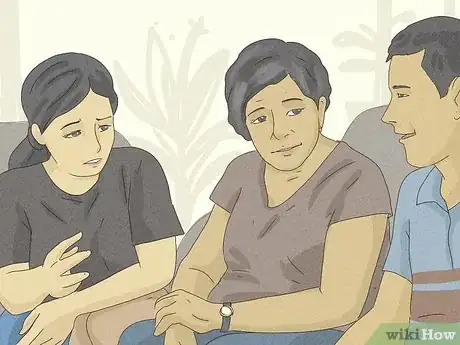





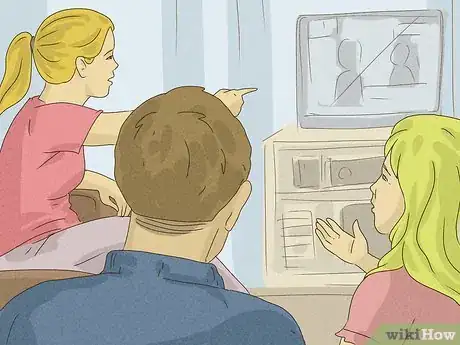






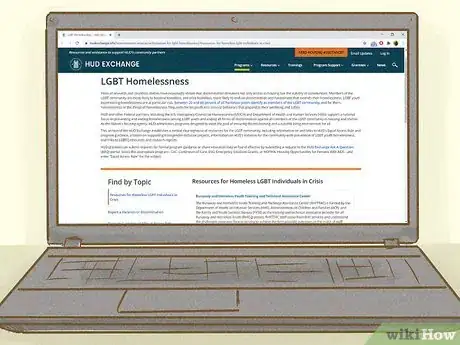



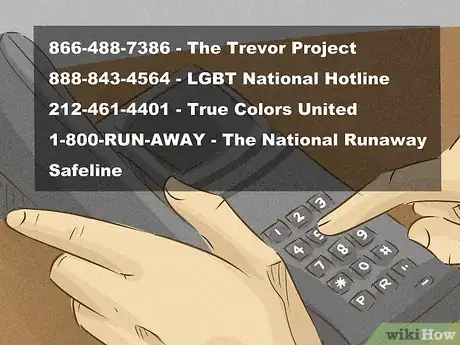
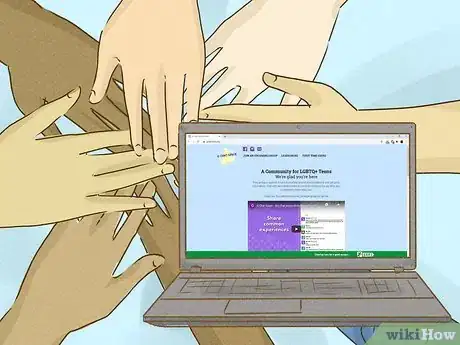




-Step-14-Version-2.webp)
-Step-16.webp)



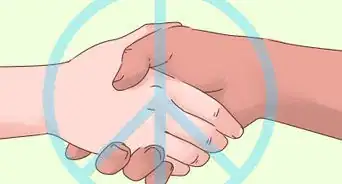

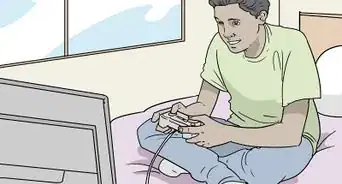












-Step-14-Version-2.webp)
-Step-16.webp)


































